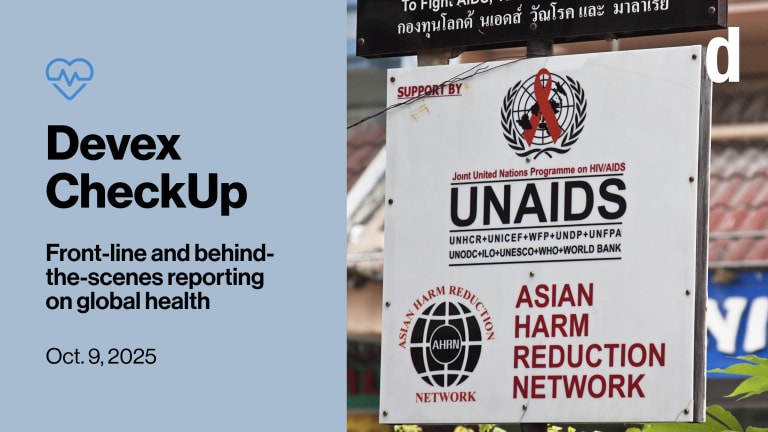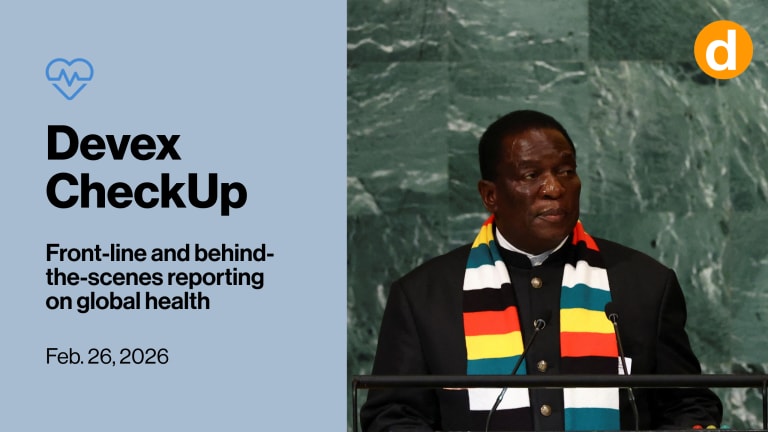Devex CheckUp: Tallying the health sector job losses caused by USAID upheaval

U.S. President Donald Trump’s efforts to dismantle the U.S. Agency for International Development over the last few weeks have impacted not just the lives of vulnerable people abroad, but also of the many development workers — including Americans — who have devoted their lives to improving the health and well-being of people globally.
Trump’s decision to dismantle the agency, which is now facing legal battles in court over questions of constitutionality, has led to mass layoffs. Most USAID staff members have been put on administrative leave, and several big contractors and international NGOs have been forced to furlough hundreds of staffers.
The numbers tallied by my colleagues Adva Saldinger and Sara Jerving are mind-boggling.
• Chemonics, which runs the multibillion-dollar Global Health Supply Chain Program, has furloughed 750 U.S.-based staff members, the equivalent of about 63% of its workforce, and plans to lay off more people by the end of February.
• Democracy International, which has medical aid programs in countries such as Bangladesh, has furloughed all of its 95 U.S.-based employees and placed 92% of its 176 overseas staff on unpaid administrative leave.
• DAI, which has numerous health projects including in health security, has furloughed 383 U.S.-based staff members.
• Management Sciences for Health, whose projects include helping countries strengthen their health systems, has furloughed half its staff, fired consultants, and may be forced to lay off 1,000 of its employees globally.
• Over 400 institutional support contractors working for the Global Health Training, Advisory, and Support Contract, or GHTASC, under USAID’s Bureau for Global Health, were abruptly laid off, with no severance pay, and their health insurance cut days later.
Credence Management Solutions LLC, the prime holder of GHTASC, declined to comment on the layoffs. But the Trump administration is expected to expand this trend of privatizing the workforce, Sara tells me.
That may save the government some dollars — but also raises labor concerns. These workers were in a yearslong battle over labor conditions and then unceremoniously sacked.
Read: Major new lawsuit filed by USAID contractors, NGOs challenges aid freeze
Plus: Unceremonious sacking may preview the future of privatizing US aid
Waivering goodbye
USAID’s freeze is supposed to have exceptions, including for lifesaving medicines. But for those on the ground, the waiver process isn’t as cut and dry as it’s been purported to be.
While Kenya’s HIV funding has, in theory, been restarted, Sara got eyes on an email describing the chaos of the actual process, which includes a nonfunctional payments system. That means the religious NGO Mission for Essential Drugs and Supplies doesn’t have the money it needs to perform its contracted duties of warehousing, procurement, and distribution for those medicines.
Meanwhile, in Uganda, Devex Contributing Reporter Andrew Green tells me efforts to restart programming have been slow-moving. But still, those fighting HIV have vowed to continue, U.S. funding or not, in a meeting at the Vatican.
Scoop: USAID Kenya partner has 'no funds' to carry out PEPFAR waiver
Read: At Vatican meeting, HIV advocates vow to fight past USAID setbacks
+ Devex Pro members can read key takeaways from a recent Devex Pro Briefing with Chip Lyons on scaling up pediatric HIV treatment and prevention. Not yet a Pro member? Access all our exclusive reporting and analyses, data-driven funding insights, members-only events, and the world’s largest global development job board by starting a 15-day free trial today.
On the ground
Local NGOs working on family planning are not spared from the stop-work orders. NGOs in Afghanistan, Bangladesh, and Malawi tell me they had to shutter clinics and suspend hundreds of staffers as soon as they received the orders. Some were forced to let go of their staff members with no pay.
While these organizations knew that Trump would reimpose the global gag rule — which prohibits the U.S. from funding organizations that are involved in any abortion-related activity, even if they use non-U.S. funding for those — some of them thought they could still continue with their projects until the end of the obligated period and smoothly transition their activities. They were not prepared for the stop-work order.
In Afghanistan, where women are already living in very strict conditions under the Taliban, some of those clinics serve as their only access to health care without requiring a mahram, or a male chaperone. It’s unclear if they will be able to reopen.
Read: How Trump's aid freeze is gutting a lifeline for women and girls
ICYMI: NGOs in Afghanistan left guessing on waivers as humanitarian aid stalls
+ Watch: During a recent digital event hosted by Devex, development career experts offered guidance on how to best prepare for the potential impacts of the Trump administration on the job market.
Never too far away
Noncommunicable diseases have traditionally received little funding and attention, including from the U.S. government, the largest bilateral donor to global health. But those working on NCDs fear it will now be further deprioritized by governments as they scramble to fill in the gaps left by USAID.
Katie Dain, CEO of NCD Alliance, tells Sara in Kigali that ministers in low- and middle-income countries will likely put investments in infectious diseases and maternal health ahead of NCD concerns.
“Anything on the bottom of the list is going to get even further deprioritized,” she says.
Read: How USAID’s dismantling could impact noncommunicable diseases
The ripple effect
The impact of Trump’s orders isn’t limited to USAID. It’s been more than two weeks since staff members at the U.S. Centers for Disease Control and Prevention were ordered to stop working with the World Health Organization. As of this time, that order remains in effect, and the two entities have not had any formal communication since.
CDC and WHO staff members have closely collaborated for decades to wipe out polio, and — with other partners — have succeeded in eliminating it in most places. The disease is now endemic only in Afghanistan and Pakistan, though cases of circulating vaccine-derived poliovirus have emerged in several countries in recent years. Even the U.S. saw it in 2022.
Yet at a time when CDC expertise is badly needed, it’s not accessible. Dr. Hamid Jafari, director of polio eradication for WHO’s Eastern Mediterranean region, tells me the program is suffering from a loss of CDC technical and strategic inputs, and that they’re unable to access its global specialized poliovirus laboratory “that serves as the nerve center for poliovirus testing and characterization and detection of polio outbreaks.”
They are now diverting samples for testing to other specialized labs, but it costs more, and it’s taking them longer to obtain results.
Read: US decision to cut ties with WHO hurting polio eradication efforts
One big number
$50 billion
—That’s the size of the endowment fund WHO is considering as it seeks to make funding more sustainable and stabilize after the exit of the U.S. Still, WHO chief Tedros Adhanom Ghebreyesus noted that it won’t be easy to do, emphasizing that for now, “this is just an idea that hopefully will be realized.”
Read: WHO chief eyes idea of a $50B endowment fund to plug resource gaps
Some good news
In the wake of the aid freezes and stop-work orders, I asked several health-focused organizations how they are impacted. One response stood out from the Pandemic Fund.
Priya Basu, head of its secretariat, tells me that pandemic prevention, preparedness, and response “is a good investment now” and that the Pandemic Fund’s third call for proposals announced in December “is moving ahead as planned.”
“[W]e are looking forward to receiving proposals by the end of May,” she says.
What we’re reading
U.K. development minister said the country won’t be able to make a pledge at Gavi’s replenishment in March amid a spending review. [Devex]
WHO launches plan to provide free cancer medicines to children in six pilot countries. [Barron’s]
Trump’s stop-work orders shut down clinical trials before they were concluded. [The New York Times]
Search for articles
Most Read
- 1
- 2
- 3
- 4
- 5








